Toba Pulp Lestari (TPL) is a pulp and paper company based in the Lake Toba region of North Sumatra, Indonesia. The pulp giant is associated with the Royal Golden Eagle group and APRIL (Indonesia’s second-largest pulp and paper company) and majority owned by Indonesian tycoon Sukanto Tanoto.
The Lake Toba region, where TPL’s land concession is located, is the ancestral home of the Indigenous Batak people. The Batak people have farmed the land and managed its forests for over 13 generations through a complex set of communal and individual customary rights, traditions, and rules. For the Batak people, as for many Indigenous and frontline communities, the forest has and continues to provide clean watersheds and shelter, medicine, food, and livelihoods. Many Batak communities also steward and plant kemenyaan (benzoin) trees, which produce a fragrant resin similar to frankincense. This resin is sold internationally and the money they make helps many farmers pay for education, travel and health care, including sending their children to college.
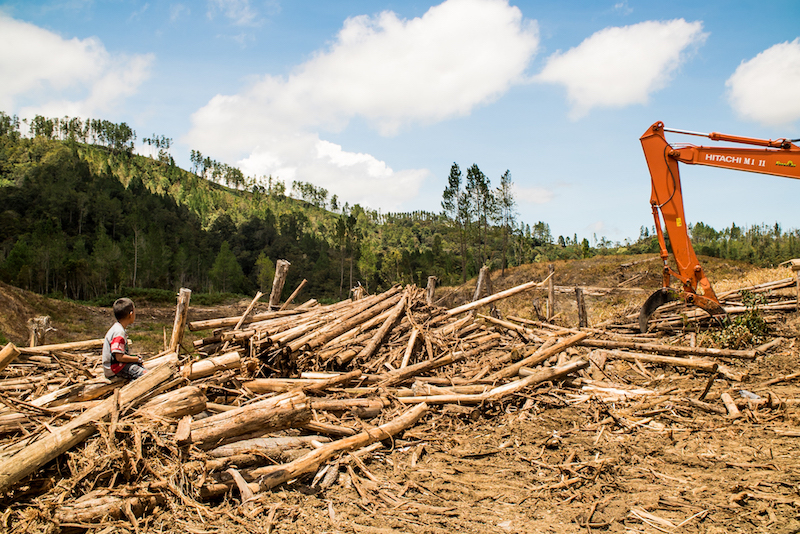 Life on the frontlines of deforestation in Aek Lung, North Sumatra, Indonesia. Photo of Toba Pulp Lestari (TPL) harvesting eucalyptus trees on land traditionally owned by Indigenous Batak communities without their consent. Learn more
Life on the frontlines of deforestation in Aek Lung, North Sumatra, Indonesia. Photo of Toba Pulp Lestari (TPL) harvesting eucalyptus trees on land traditionally owned by Indigenous Batak communities without their consent. Learn more
Despite the fact that traditional land rights have been recognized within the Batak community for generations, these rights have not been historically recognized by the Indonesian government. In the early 1980s, Indonesia’s Forest Ministry handed out Batak customary lands as part of a concession given to the Inti Indorayon Utama company, which later changed its name to PT. Toba Pulp Lestari (TPL). As TPL cleared the land, it destroyed forests, farms, and lucrative benzoin forests. As natural rainforests were cleared and converted to industrial pulp plantations, the planting of water-intensive eucalyptus trees dried up local rivers and caused a range of other negative social and environmental impacts.
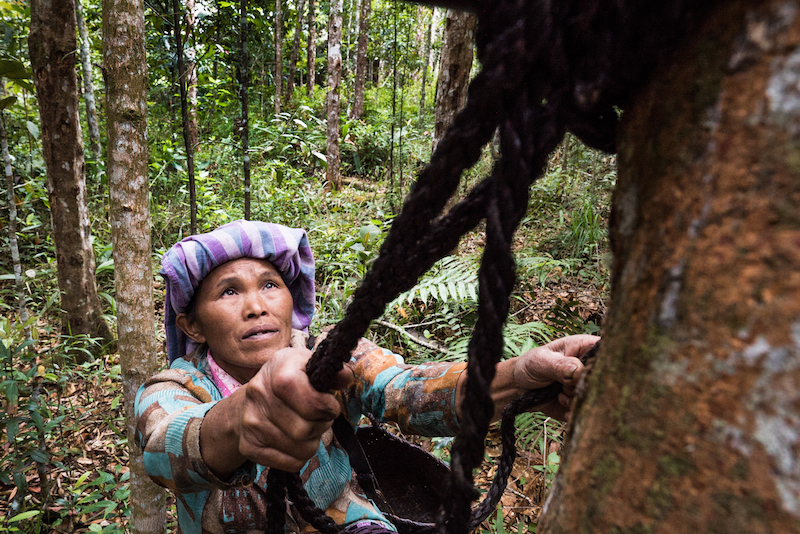 Timura br. Siregor, an Indigenous Batak woman, climbs a benzoin tree to sustainably harvest its resin in Nagasaribu, North Sumatra, Indonesia. Learn more
Timura br. Siregor, an Indigenous Batak woman, climbs a benzoin tree to sustainably harvest its resin in Nagasaribu, North Sumatra, Indonesia. Learn more
Over 20 communities, with well over 3,000 families and more than 25,000 hectares of forest and land claims, have been adversely impacted by TPL’s expansion and have active conflicts with the company. Many of these communities are taking action to protect or reclaim their lands. In 2009 and again in 2013, the community of Pandumaan-Sipituhuta took action when they found TPL employees clearing some of their resin forest and expanding plantations on customary lands. Roughly 250 residents came out to protest, confiscating the chainsaws being used. TPL called in the police mobile brigade, which arrived in the middle of the night and—threatening the community with rifles—searched through the houses of sleeping families. Local people were beaten with truncheons and elderly community members were assaulted. The police arrested 31 farmers. The police later released 15 of the farmers, with the other 16 remaining in jail for two weeks. Hundreds of people joined in protest outside of the local police station until the farmers were released.
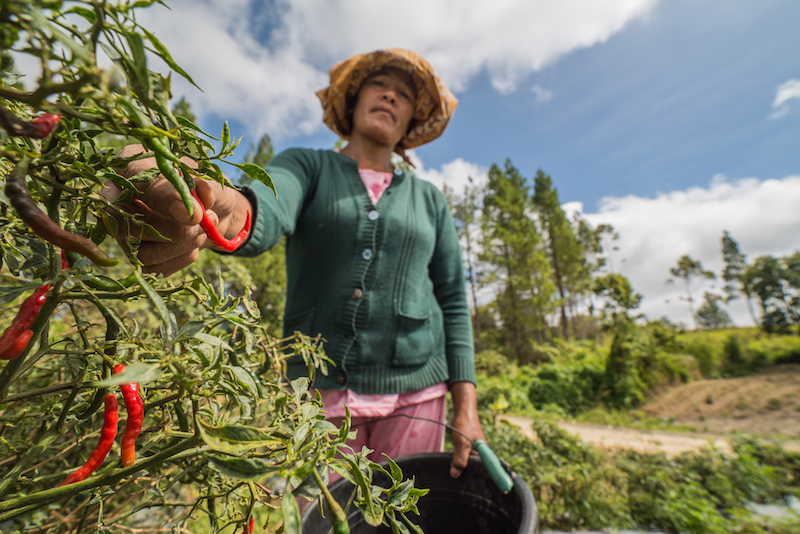 “When we cultivate our traditionally owned land Toba Pulp Lestari (TPL) terrorizes us.” Kristina br. Hutabarat farming her community-owned land in Aek Lung, North Sumatra, Indonesia. Learn more
“When we cultivate our traditionally owned land Toba Pulp Lestari (TPL) terrorizes us.” Kristina br. Hutabarat farming her community-owned land in Aek Lung, North Sumatra, Indonesia. Learn more
In 2014, international NGOs Rainforest Action Network began to profile the environmental destruction and human rights abuses associated with Toba Pulp Lestari and its production of dissolving pulp used for making viscose, rayon and other man-made cellulosic fiber. Growing concern from fashion brands about the risks of forest destruction and human rights abuses in their supply chains resulted in over 100 brands and 8 viscose manufacturers committing to eliminate these risks from their supply chain, including (in some cases) suspending business with TPL. With mounting market pressure, TPL and associated companies adopted “No deforestation, No exploitation, No peat” policies in 2015. These policies committed TPL, its sister company APRIL, as well as Royal Golden Eagle, to eliminate forest destruction and expansion on forested peatlands, seek the free, prior, and informed consent of communities, and to address social conflicts.
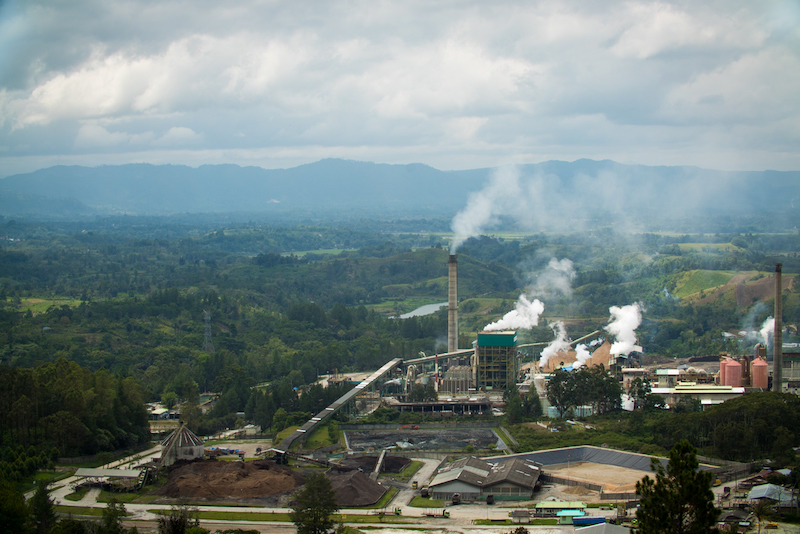 Toba Pulp Lestari’s (TPL) pulp mill near Lake Toba has been a major source of air and water pollution that has been causing illnesses in nearby communities for the last 30 years. Learn More
Toba Pulp Lestari’s (TPL) pulp mill near Lake Toba has been a major source of air and water pollution that has been causing illnesses in nearby communities for the last 30 years. Learn More
Although the clearing and conversion of natural forests have largely been suspended, these policy commitments on paper have yet to sufficiently address the harm and grievances that Batak communities continue to experience. Community members in the Batak village of Aek Lung, Op.Bolus, Nagahulambu, and Nagasaribu—as well as many others—are still fighting to have their lands excised from TPL’s concession and have their rights respected. The images and interviews at BeyondPaperPromises.org profile the ongoing issues faced by members of these communities.
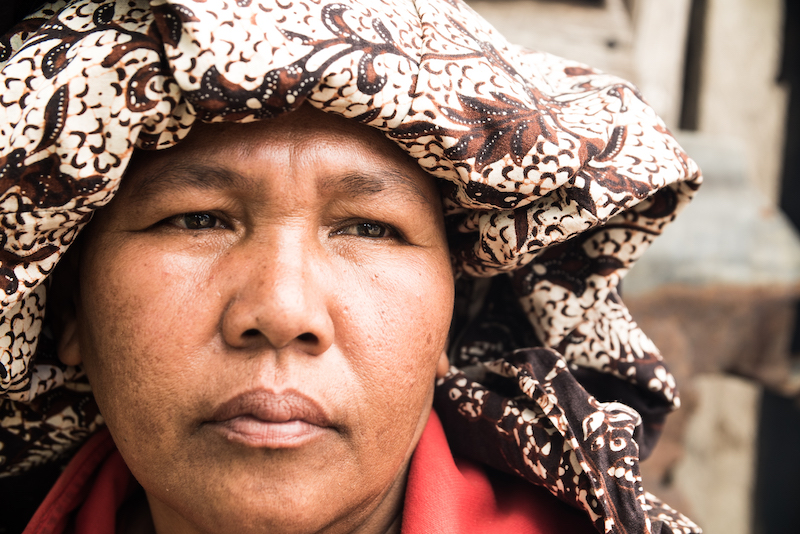
“This land is the source of our livelihoods.” Rentina Nababan in Aek Lung, North Sumatra, Indonesia. Learn more.
In December 2016, there was a notable success when decades of campaigning by frontline communities as well as by supporting NGOs (most notably the local NGO Kelompok Studi Pengembangan dan Prakarsa Masyarakyat, or KSPPM, as well as national organizations like the Indigenous Peoples Alliance of the Archipelago (AMAN) resulted in the President of Indonesia Joko Widodo and the Ministry of Environment and Forestry removing Panumaan-Sipituhuta’s 5,100 hectares of traditionally owned lands from the TPL concession. The President recognized these lands, as well as those of eight other Indigenous groups across Indonesia, as Indigenous lands. However, there is still much to be done. There are still at least 18 other communities who are actively seeking the return of their land from companies.
Click here to demand that TPL holds true to its promises and takes concrete action to make sure that the Batak culture and rights are respected, the land that they rely on is returned and the harm they have experienced is remedied.












